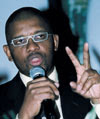Quote of the week
[T]he moral point of the matter is never reached by calling what happened by the name of ‘genocide’ or by counting the many millions of victims: extermination of whole peoples had happened before in antiquity, as well as in modern colonization. It is reached only when we realize this happened within the frame of a legal order and that the cornerstone of this ‘new law’ consisted of the command ‘Thou shall kill,’ not thy enemy but innocent people who were not even potentially dangerous, and not for any reason of necessity but, on the contrary, even against all military and other utilitarian calculations. … And these deeds were not committed by outlaws, monsters, or raving sadists, but by the most respected members of respectable society.
Eichmann in Jerusalem: A Report on The Banality of Evil
Dali Mpofu should rather not dabble in constitutional law
It’s a good thing Dali Mpofu, Group CEO and Editor-in-Chief of His Masters Voice also known as the SABC has stopped arguing constitutional law cases because he obviously has no clue of how to interpret the Bill of Rights.
In his letter announcing the SABC’s resignation from the South African National Editors Forum (SANEF) he argues (quite correctly) that at the heart of our Bill of Rights is the protection of human dignity and that most rights flow from the understanding that peoples’ human dignity should be respected and protected.
But then he makes a logical jump: human dignity must trump the right to freedom of expression and newspapers therefore never have the right to publish things that would affect the personal dignity of an important elected representative like our beloved Minister of Health.
We cannot remain quiet while our mothers and our democratically chosen leaders are stripped naked for the sole reason of selling newspapers.
The problem is that Dali – like many lawyers still stuck in the pre-constitutional common law paradigm – confuses the personal subjective dignity of an individual usually protected by the common law and the very different objective constitutional right and value of dignity.
The constitutional notion of dignity flows from the assumption that every individual has an inherent human dignity because he or she is human being. The apartheid government did not respect this dignity because it denied individuals the right to moral agency and thus the right to define for themselves who they are and how they want to live their lives. If one denies people the right to an identity, one denies that the person has an inherent moral worth and thus deny that person her dignity.
Protecting a person’s dignity in the constitutional sense therefore has very little to do with ensuring that important politicians do not have their feelings hurt by the truth – the common law of defamation takes care of that potential harm in appropriate cases. The Constitution, on the other hand, deals with a far more profound and important notion of dignity because it aims at creating a society in which each human being’s humanity is equally respected – whether one is a mother of the nation, an elected official, a homeless DA supporter or even Dali Mpofu.
This notion of dignity is aspirational and deeply optimistic. It suggests that humans are so special that we should respect their moral agency equally so that they can decide for themselves who they are and how they want to live. In short: a society where the equal moral worth of all will be respected.
But we cannot decide for ourselves how to live and who we are, we cannot begin to have moral agency, if we are not informed by the media about what is happening in the world and what our options are. To suppress information of public importance is to treat people like children and hence to disrespect their human dignity.
Politicians and boot-lickers of the powerful and influential who claim that their personal subjective dignity should trump the objective, more profound, dignity protected in the Constitution, are therefore self-serving charlatans hiding behind a completely false understanding of the Constitution.
The constitution protection of the dignity of every person therefore demands that we protect the vigorous, critical and fearless media from interference by self-serving politicians and other higher ups.
What people like Dali Mpofu really seem to think is that the Constitution should protect politicians and others important people from the truth – especially where the truth would reflect badly on that person and may reveal that the person is incompetent, corrupt, dishonest, craven or just plain stupid. Such revelations would obviously be personally hurtful and would affect the persons subjective dignity, but it would have nothing to do with the Constitutional concept of dignity.
To argue otherwise is obviously dangerous and perverting of the Constitution and should be resisted at all cost.
BACK TO TOP

